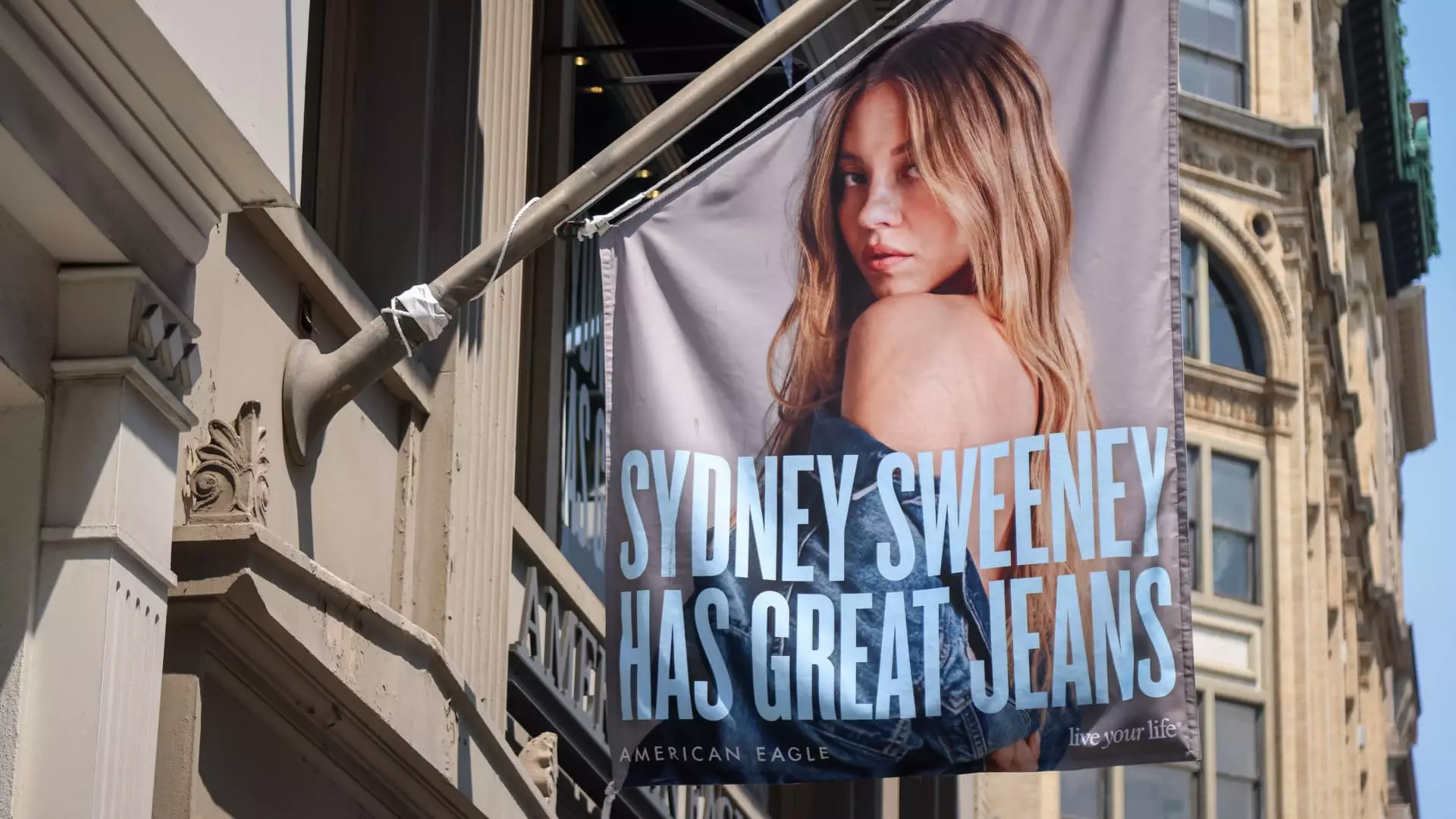In the fiercely competitive landscape of modern retail, corporations are constantly trying to navigate the tumultuous waters of consumer sentiment. The recent surge in American Eagle’s stock following President Trump’s endorsement underscores a profound truth: celebrity influence can significantly sway public perception and market performance. Yet, this episode also exposes the fragility of relying heavily on external validation—be it from political figures or pop icons—in shaping a brand’s destiny. While some hail Trump’s praise as a stroke of marketing genius, it’s critical to question whether this boost reflects genuine consumer loyalty or fleeting political spectacle.
Celebrity endorsements possess undeniable power. They allow brands to tap into the audiences and cultural narratives associated with certain figures. However, the assumption that a political or celebrity figure’s opinion can translate into sustainable growth often overlooks deeper issues: the authenticity of the campaign, societal values, and the long-term branding strategy. American Eagle’s decision to celebrate actress Sydney Sweeney, linked to a recent marketing campaign that elicited mixed reactions, reveals an underlying reckoning in how brands approach cultural sensitivity and authenticity. Do these endorsements genuinely resonate with the target demographic, or do they risk alienating core consumers?
This incident raises questions about the nature of influence in an era where social media amplifies every message, whether well-intentioned or not. The mention from Trump, a figure famously polarizing, added fuel to the fire, causing a dramatic market response that seemed more reactionary than strategic. Such volatility highlights that relying on political or celebrity endorsements alone to buoy a struggling brand is precarious. True resilience arises from authentic engagement—understanding what consumers genuinely seek and aligning campaigns accordingly. If American Eagle’s goal was to reignite its brand with honesty, it needed more than a viral moment; it required a clear, value-driven narrative that resonates beyond fleeting popularity.
The Cultural Divide and the Danger of Missteps in Marketing
American Eagle’s campaign, which included a slogan “Sydney Sweeney has great jeans,” was met with criticism that reveals a deeper cultural divide. Critics argued that the phrase was a double entendre, superficial, or even offensive—highlighting how sensitive the current social climate is to notions of branding and representation. The backlash underscores a vital lesson: marketing today can no longer exist in a vacuum. Messages that may seem playful or lighthearted to some can easily be interpreted as tone-deaf or dismissive by others.
This phenomenon exemplifies the broader challenge faced by brands trying to appeal to diverse audiences within a polarized society. There’s a fine line between pushing boundaries and crossing into controversy. American Eagle’s initial silence, followed by a brief reassurance that the slogan was about the jeans, reflects an internal hesitancy that many corporations experience when they find themselves caught in crossfire. The risk of misjudging cultural sensitivities is high, yet the avoidance of difficult conversations often leads to further misunderstandings or reputational damage.
Furthermore, the campaign’s backlash exposes the pitfalls of attempting to pander to one side of the cultural spectrum while alienating another. This balancing act is inherently risky; brands must decide whose values they prioritize and whether that aligns with their core identity. American Eagle appears to have underestimated the importance of contextual awareness in marketing communications. Embracing authenticity—acknowledging diverse perspectives and steering clear of potentially offensive double entendres—is crucial for gaining genuine trust. Ultimately, brands that fail to recognize and respect the complexity of cultural sentiment risk watering down their message and losing credibility.
Economic Realities vs. The Illusion of Viral Success
While the public stares at the fireworks of social media drama and celebrity shoutouts, the underlying economic struggles of American Eagle remain unaddressed. The company’s recent financial report paints a sobering picture: falling sales, declining margins, and macroeconomic headwinds that threaten its very survival. The quick boost in search interest following Trump’s post might offer a momentary illusion of redemption, but it does little to alter the fundamental business climate that American Eagle faces.
In an environment where consumer spending becomes unpredictable due to inflation, tariffs, and economic uncertainty, brands must focus on substantive value rather than ephemeral hype. Marketing stunts, no matter how sensational, cannot substitute for solid product offerings and strategic innovation. The company’s attempt to capitalize on celebrity-driven campaigns appears more like a desperate grasp for relevance than a sustainable growth plan. Relying on transient social buzz may bring short-term attention, but it does little to counteract deeper issues like merchandising missteps or a lack of connection with evolving consumer expectations.
Moreover, the broader lesson is that companies need to find authentic ways to connect with consumers—values and stories that reflect the realities and aspirations of their audience. American Eagle’s struggle to grow sales amid recession fears and changing fashion tastes reveals a disconnect that no viral campaign can fix. A focus on genuine inclusivity, quality, and emotional resonance should be the compass guiding the brand forward—not fleeting moments of social media fame or political endorsements. The harsh truth remains: unless brands adapt their core strategies, they risk falling behind in a landscape that increasingly demands authenticity over superficial engagement.

